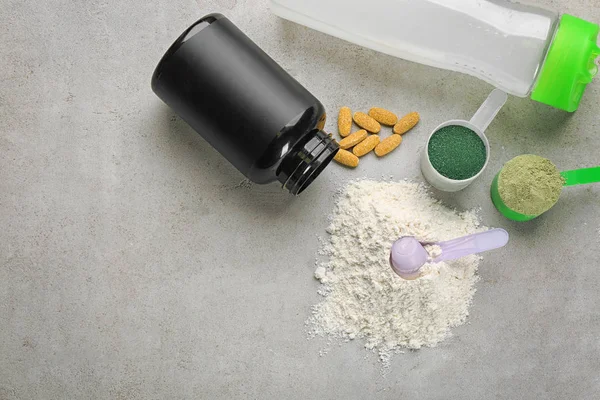Testosterone boosters, available as over-the-counter supplements, claim to elevate testosterone levels and alleviate symptoms of low testosterone. Nonetheless, insufficient evidence supports the effectiveness of these supplements. Moreover, a notable 10.1% of testosterone boosters on the market contain ingredients that could potentially decrease testosterone levels.
Testosterone Supplements vs. Testosterone Therapy
If you’re seeking ways to enhance your testosterone levels and improve your sex drive, you might have come across various options, including testosterone supplements and testosterone replacement therapy (TRT). Both approaches aim to address low testosterone levels, but they differ significantly in terms of effectiveness, safety, and overall impact on your health.
Testosterone Supplements: Enhancing Sex Drive Naturally?
Testosterone supplements have gained popularity as potential solutions to low libido and sexual performance issues. These over-the-counter (OTC) products often contain a mix of vitamins, minerals, and herbal extracts intended to promote testosterone production in the body. While they may offer promise for boosting testosterone, it’s essential to understand their limitations.
Effectiveness and Reliability of Testosterone Supplements
Research on the effectiveness of testosterone supplements remains limited and often inconclusive. Many of these supplements claim to increase testosterone levels, but a significant number lack scientific evidence to support these claims. In a study evaluating numerous “T booster” supplements, only a fraction had verifiable data to back their assertions, and some even contained ingredients that could have adverse effects on testosterone production.
Fenugreek
Studies exploring fenugreek’s impact on testosterone yield mixed and inconclusive outcomes. A study involving 44 participants taking a fenugreek supplement displayed slight changes in testosterone levels, which were not significant in comparison to the placebo group.
Zinc
Zinc’s impact on testosterone is marked by a deficiency association rather than a direct increase. Zinc supplements commonly found in testosterone boosters may result in adverse effects like nausea, vomiting, and headaches when taken excessively.
Maca
No evidence supports maca’s capacity to elevate testosterone levels. Its safety profile, including proper dosage and potential toxic effects, remains largely unexamined.
Ashwagandha
A review suggests ashwagandha may increase testosterone levels, primarily in cases of infertility or low sperm count. However, larger-scale, diverse research is essential to confirm these effects, alongside clarifying its safety.
Are Testosterone Boosters Safe?
Common ingredients in testosterone booster supplements can cause the following side effects:
- Fenugreek: This supplement can lead to low white blood cell counts, impacting a person’s immune function.
- Zinc: High levels of zinc can cause gastric distress, dizziness, and headaches. Additionally, consuming high levels of zinc over a long period can interfere with copper and iron levels and alter immune function.
- Maca: This supplement can cause high blood pressure, although more research is necessary to investigate maca’s safety.
- Ashwagandha: Taking large amounts of this supplement may cause diarrhea, nausea, or vomiting.
Testosterone Replacement Therapy (TRT): The Clinically Proven Approach
In contrast to testosterone supplements, testosterone replacement therapy (TRT) is a medically supervised treatment option prescribed by healthcare professionals. TRT involves the administration of actual testosterone through injections, oral medications, or topical creams. This therapy is designed to restore testosterone levels to a healthy range, addressing a variety of symptoms associated with low testosterone.
Advantages of Testosterone Replacement Therapy (TRT):
- Clinical Supervision: TRT is closely monitored by medical professionals, ensuring proper dosing and management.
- Evidence-Based Approach: TRT has a strong foundation in scientific research and clinical studies, providing more reliable outcomes.
- Direct Hormone Replacement: TRT directly addresses low testosterone by supplementing the hormone in your body, leading to more noticeable and consistent effects.
- Tailored Treatment: TRT can be personalized based on your specific needs, optimizing results while minimizing risks.
- Potential for Comprehensive Benefits: TRT not only targets sexual health but also offers benefits for bone density, muscle mass, and overall well-being.
Choosing the Right Approach for You
When deciding between testosterone supplements and TRT, it’s crucial to consider the potential benefits and risks associated with each option. While supplements may offer a convenient over-the-counter solution, their effectiveness and safety are uncertain. On the other hand, TRT is supported by extensive clinical research and medical expertise, offering a more comprehensive and reliable approach to addressing low testosterone levels. Before making a decision, consult a healthcare professional who can provide personalized guidance based on your health status, medical history, and treatment goals. Ultimately, prioritizing your health and well-being should guide your choice toward the most effective and safe approach to enhancing your testosterone levels and improving your sex drive.


